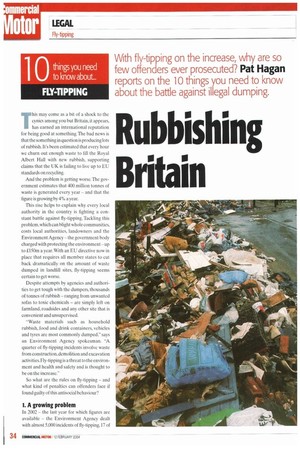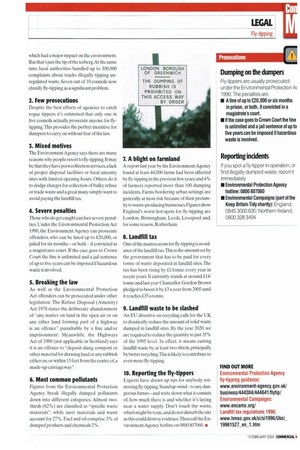Rubbishing
Page 34

Page 35

If you've noticed an error in this article please click here to report it so we can fix it.
Britain
With fly-tipping on the increase, why are so few offenders ever prosecuted? Pat Hagan reports on the 10 things you need to know about the battle against illegal dumping.
This may come as a bit of a shock to the cynics among you but Britain, it appears, has earned an international reputation for being good at something. The bad news is that the something in question is producing lots of rubbish. It's been estimated that every hour we churn out enough waste to fill the Royal Albert Hall with new rubbish, supporting claims that the UK is failing to live up to EU standards on recycling.
And the problem is getting worse. The government estimates that 400 million tonnes of waste is generated every year and that the figure is growing by 4% a year.
This rise helps to explain why every local authority in the country is fighting a constant battle against fly-tipping. Tackling this problem. which can blight whole communities. costs local authorities, landowners and the Environment Agency-the government body charged with protecting the environmentup to £150m a year With an EU directive now in place that requires all member states to cut back dramatically on the amount of waste dumped in landfill sites, fly-tipping seems certain to get worse.
Despite attempts by agencies and authorities to get tough with the dumpers, thousands of tonnes of rubbish ranging from unwanted sofas to toxic chemicals are simply left on farmland, roadsides and any other site that is convenient and unsupervised.
"Waste materials such as household rubbish, food and drink containers, vehicles and tyres are most commonly dumped." says an Environment Agency spokesman. "A quarter of fly-tipping incidents involve waste from construction, demolition and excavation activities. Fly-tipping is a threat to the environment and health and safety and is thought to be on the increase."
So what are the rules on fly-tipping and what kind of penalties can offenders face if found guilty of this antisocial behaviour?
1. A growing problem In 2002 the last year for which figures are available the Environment Agency dealt with almost 5,000 incidents of fly-tipping, 17 of which had a major impact on the environment. But that's just the tip of the iceberg.At the same time local authorities handled up to 300,000 complaints about trucks illegally tipping unregulated waste. Seven out of 10 councils now classify fly-tipping as a significant problem.
2. Few prosecutions Despite the best efforts of agencies to catch rogue tippers, it's estimated that only one in five councils actually prosecute anyone for flytipping. This provides the perfect incentive for dumpers to carry on without fear of the law.
3. Mixed motives The Environment Agency says there are many reasons why people resort to fly-tipping. It may be that they have poor collection services,a lack of proper disposal facilities or local amenity sites with limited opening hours. Others do it to dodge charges for collection of bulky refuse or trade waste and a great many simply want to avoid paying the landfill tax.
4. Severe penalties Those who do get caught can face severe penalties. Under the Environmental Protection Act 1990, the Environment Agency can prosecute offenders, who can be lined up to £20,000, or jailed for six months — or both — if convicted in a magistrates court. If the case goes to Crown Court the fine is unlimited and a jail sentence of up to five years can be imposed if hazardous waste is involved.
5. Breaking the law As well as the Environmental Protection Act offenders can be prosecuted under other legislation. The Refuse Disposal (Amenity) Act 1978 states the deliberate abandonment of "any matter on land in the open air or on any other land forming part of a highway is an offence" punishable by a fine and/or imprisonment. Meanwhile, the Highways Act of 1980 (not applicable in Scotland) says it is an offence to "deposit dung. compost or other material for dressing land or any rubbish either on. or within 15 feet from the centre of, a made-up carriageway".
6. Most common pollutants Figures from the Environmental Protection Agency break illegally dumped pollutants down into different categories, Almost twothirds (62%) are classified as "specific waste materials", while inert materials and waste account for 27%. Fuel and oil comprise 3% of dumped products and chemicals 2%. 7. A blight on farmland A report last year by the Environment Agency found at least 44,000 farms had been affected by fly-tipping in the previous few years,and 4% of farmers reported more than 100 dumping incidents. Farms bordering urban settings are generally at most risk because of their proximity to waste-producing businesses.Figures show England's worst hot-spots for fly-tipping are London, Birmingham. Leeds, Liverpool and. for some reason, Rotherham.
8. Landfill tax One of the main reasons for fly-tipping is avoidance of the landfill tax.This is the amount set by the government that has to be paid for every tonne of waste deposited in landfill sites. The tax has been rising by £1/tonne every year in recent years. it currently stands at around £14/ tonne and last year Chancellor Gordon Brown pledged to boost it by £3 a year from 2005 until it reaches £35 a tonne.
9. Landfill waste to be slashed An EU directive on recycling calls for the UK to drastically reduce the amount of solid waste dumped in landfill sites. By the year 2020, we are required to reduce the quantity to just 35% of the 1995 level. In effect, it means cutting landfill waste by at least two-thirds, principally by better recycling.This is likely to contribute to even more fly-tipping.
10. Reporting the fly-tippers Experts have drawn up tips for anybody witnessing fly-tipping. Stand up-wind— to any dangerous fumes— and write down what it consists of, how much there is and whether it's laying near a water supply. Don't touch the waste, which might be toxic.and do not disturb the site as this could destroy evidence.Then call the Environment Agency hotline on 0800807060. •
Dumping on the dumpers
Fly-tippers are usually prosecuted under the Environmental Protection A( 1990. The penalties are:
• A fine of up to £20,000 or six months in prison, or both, if convicted in a magistrate's court.
• If the case goes to Crown Court the fine is unlimited and a jail sentence of up to five years can he imposed if hazardous waste is involved.
Reporting inddents
If you spot a fly-tipper in operation, or find illegally dumped waste, report it immediately.
• Environmental Protection Agency hotline: 0800 807060
• Environmental Campaigns (part ot the Keep Britain Tidy charity): England, 0845 3000 630; Northern Ireland, 0800 328 3494
FIND OUT MORE Environmental Protection Agency ily-tipping guidance: www.environment-agency.gov.uk/ business/444304/444641/flytip/ Environmental Campaigns: www.encarns.org/
Landfill tax regulations 1996: www.hmso.gov.ukisi/s11996/Uksi 19961527 en 1.hlm






























































































































































































